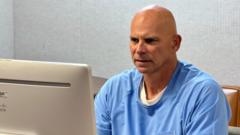The decision follows a lengthy hearing where Erik discussed his remorse and potential paths forward, as the Menendez brothers' legacy continues to spark debate.
**Erik Menendez Parole Bid Denied Amid Ongoing Controversy Over 1989 Murders**

**Erik Menendez Parole Bid Denied Amid Ongoing Controversy Over 1989 Murders**
California parole board denies Erik Menendez's request for early release after 34 years for the infamous shotgun killings of his parents.
Erik Menendez's attempt to gain parole has been rejected by California officials, three decades after he and his brother Lyle were convicted of the 1989 shotgun murders of their wealthy parents, Jose and Kitty Menendez, in Beverly Hills. During his first parole hearing, held virtually from his San Diego prison, Erik detailed his remorse about the killings, which he claims were a desperate act of self-defense against years of abuse from his parents.
Despite emotional testimonies, including support from family members, the board expressed concerns about Erik’s prison conduct and the violent nature of the original crime. Parole board commissioner Robert Barton stated that Erik has not demonstrated that he poses no threat to public safety. “You have not been a model prisoner,” he noted, highlighting Erik's past rule-breaking in prison and earlier burglaries prior to the murders.
While Erik has lost this round in his quest for freedom, the ruling does allow for another hearing in three years. Meanwhile, the attention now shifts to Lyle, whose own parole hearing is anticipated shortly. The circumstances surrounding Erik’s and Lyle's case remain divisive, with public sentiment influenced by media portrayals and evolving understandings of juvenile justice.
Governor Gavin Newsom may also find himself at a crossroads as he weighs a clemency request from the Menendez brothers, which could further complicate his political aspirations as a potential Democratic presidential candidate. Observers note the heightened scrutiny surrounding this high-profile case and the implications of possible clemency or new trials due to emerging evidence.
During Erik's hearing, testimonies presented included that of his aunt, who emotionally shared her desire for his release as she battles terminal cancer, advocating forgiveness and healing for the family. Despite this, prosecutors maintained that Erik remains a risk, suggesting that positive changes in his behavior were self-serving and not indicative of genuine rehabilitation.
The Menendez brothers’ case remains emblematic of broader societal debates surrounding abuse, mental health, and criminal justice complexities, fueled by increased public interest through various media channels. The judicial landscape could change further as judicial decisions on clemency and new trials loom, underlining the dual narratives that characterize the Menendez saga—both as tragic family history and a case study in the American justice system.
Despite emotional testimonies, including support from family members, the board expressed concerns about Erik’s prison conduct and the violent nature of the original crime. Parole board commissioner Robert Barton stated that Erik has not demonstrated that he poses no threat to public safety. “You have not been a model prisoner,” he noted, highlighting Erik's past rule-breaking in prison and earlier burglaries prior to the murders.
While Erik has lost this round in his quest for freedom, the ruling does allow for another hearing in three years. Meanwhile, the attention now shifts to Lyle, whose own parole hearing is anticipated shortly. The circumstances surrounding Erik’s and Lyle's case remain divisive, with public sentiment influenced by media portrayals and evolving understandings of juvenile justice.
Governor Gavin Newsom may also find himself at a crossroads as he weighs a clemency request from the Menendez brothers, which could further complicate his political aspirations as a potential Democratic presidential candidate. Observers note the heightened scrutiny surrounding this high-profile case and the implications of possible clemency or new trials due to emerging evidence.
During Erik's hearing, testimonies presented included that of his aunt, who emotionally shared her desire for his release as she battles terminal cancer, advocating forgiveness and healing for the family. Despite this, prosecutors maintained that Erik remains a risk, suggesting that positive changes in his behavior were self-serving and not indicative of genuine rehabilitation.
The Menendez brothers’ case remains emblematic of broader societal debates surrounding abuse, mental health, and criminal justice complexities, fueled by increased public interest through various media channels. The judicial landscape could change further as judicial decisions on clemency and new trials loom, underlining the dual narratives that characterize the Menendez saga—both as tragic family history and a case study in the American justice system.




















